
The white-throated hawk is a bird of prey in subfamily Accipitrinae, the "true" hawks, of family Accipitridae. It is found in Argentina, Bolivia, Chile, Colombia, Ecuador, Peru, and Venezuela.

The bat falcon is a bird of prey in the family Falconidae, the falcons and caracaras. It is found in Mexico, Central America, Trinidad, and every mainland South American country except Chile and Uruguay.

The tropical mockingbird is a resident breeding bird from southern Mexico to northern and eastern South America and in the Lesser Antilles and other Caribbean islands.

The puna snipe is a bird in tribe Scolopancinai and subfamily Scolopacinae of family Scolopacidae, the sandpipers and relatives. It is found in Argentina, Bolivia, Chile, and Peru.
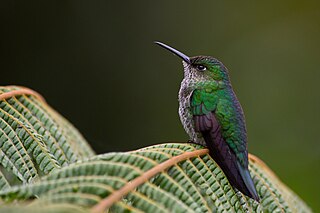
The many-spotted hummingbird is a species of hummingbird in the "emeralds", tribe Trochilini of subfamily Trochilinae. It is found in Bolivia, Colombia, Ecuador, Peru, and possibly Argentina.
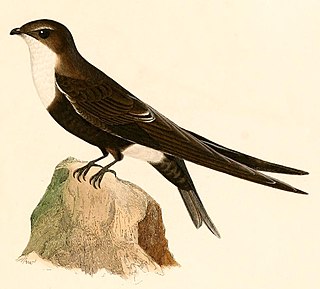
The white-tipped swift is a species of bird in subfamily Apodinae of the swift family Apodidae. It is found in Argentina, Bolivia, Brazil, Colombia, Ecuador, French Guiana, Peru, Suriname, Venezuela, and possibly Guyana.

Rothschild's swift is a Near Threatened species of bird in subfamily Cypseloidinae of the swift family Apodidae. It is found in Argentina and Bolivia.

The great dusky swift is a species of bird in subfamily Cypseloidinae of the swift family Apodidae. It is found in Argentina, Brazil, Paraguay, and possibly Bolivia.

The spot-tailed nightjar is a species of nightjar in the family Caprimulgidae. It is found in Honduras, Mexico, Nicaragua, and every mainland South American country except Chile and Uruguay.

The blackish nightjar is a species of bird in the family Caprimulgidae. It is found in Brazil, Bolivia, Colombia, Ecuador, French Guiana, Guyana, Peru, Suriname, and Venezuela.

The sickle-winged nightjar is a species of nightjar in the family Caprimulgidae. It is found in Argentina, Brazil, Paraguay and possibly Uruguay.

The long-trained nightjar is a species of nightjar in the family Caprimulgidae. It is found in Argentina and Brazil.

The two-banded plover is a species of bird in subfamily Charadriinae of family Charadriidae. It is found in Argentina, Brazil, Chile, the Falkland Islands, and Uruguay.
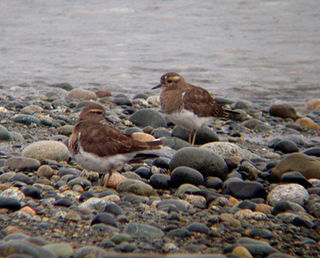
The rufous-chested plover or rufous-chested dotterel, is a species of bird in subfamily Charadriinae of family Charadriidae. It is found in Argentina, Brazil, Chile, Uruguay, and the Falkland Islands.

The Andean gull is a species in subfamily Larinae of the family Laridae, the gulls, terns, and skimmers. It is found in Argentina, Bolivia, Chile, Colombia, Ecuador, and Peru.
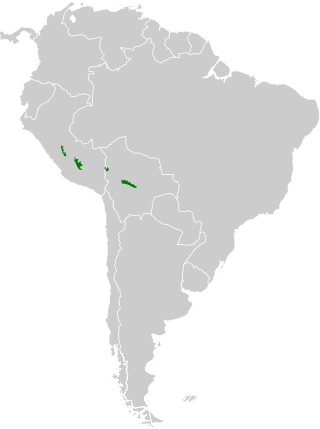
The cloud-forest screech owl is a species of owl in the family Strigidae. It is found in Bolivia and Peru.

The planalto hermit is a species of bird in the family Trochilidae, the hummingbirds. It is found in Argentina, Bolivia, Brazil, Paraguay, and Peru.

The spot-winged pigeon is a species of bird in the family Columbidae. It is found in Argentina, Bolivia, Brazil, Chile, Paraguay, Peru, and Uruguay.
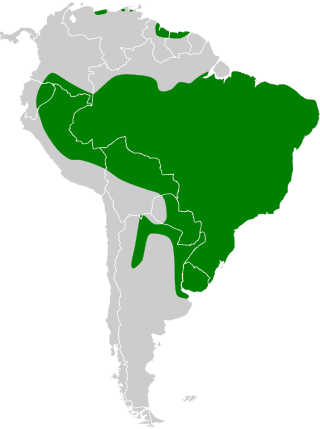
The rufous-sided crake is a species of bird in subfamily Rallinae of family Rallidae, the rails, gallinules, and coots. It is found in every mainland South American country except Chile.
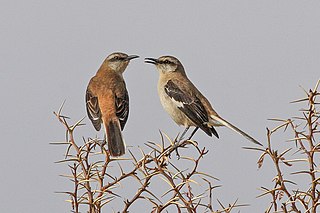
The brown-backed mockingbird is a species of bird in the family Mimidae. It is found in Argentina and Bolivia.
























